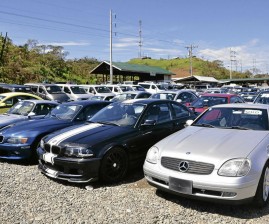
USED LUXURY CARS GALORE BMWs, Mercedes Benzes and Porsches await buyers at a car lot near Port Irene in Sta. Ana, Cagayan province. A Supreme Court ruling upholding an executive order banning the importation of used cars at the Cagayan free port is expected to end the “virtual smuggling” of these vehicles in the country. MELVIN GASCON/INQUIRER NORTHERN LUZON
BAYOMBONG, Nueva Vizcaya—The Supreme Court decision declaring the constitutionality of an executive order banning used-car importation into the country will put a stop to the “virtual smuggling” of vehicles at a free port in Cagayan province, a Malacañang official said over the weekend.
Manuel Mamba, chief of the Presidential Legislative Liaison Office, said the delay in the resolution of the case on the constitutionality of Executive Order No. 156 had allowed unscrupulous officials in government and the private sector to use it as a shield for their alleged car smuggling at the Cagayan Special Economic Zone and Freeport (CSEZF) in Sta. Ana town.
“It’s about time these [activities] stop because it’s really smuggling, if you come to think of it. [The Supreme Court decision] removes the legal blanket that some people have been using to protect their trade,” said Mamba, a former Cagayan representative.
He was reacting to reports that the Supreme Court had declared that the ban on imported used vehicles, as imposed by EO 156 issued in 2002 by then President Gloria Macapagal-Arroyo, also covered vehicle imports made through the Cagayan free port.
The Inquirer was able to reach officials of the Cagayan Economic Zone Authority (Ceza), which manages CSEZF, but they declined to comment on the court ruling.
“We will issue a press statement, including relevant data, as soon as we receive the [Supreme Court] decision and after our lawyers [have] studied it,” said Nilo Aldeguer, CSEZF senior deputy administrator.
The case stemmed from a 2008 suit filed by car dealers at the CSEZF in Regional Trial Court Branch 6 in Aparri, Cagayan, which questioned the application of EO 156 on car imports there.
The petitioners, led by Forerunner Multi Resources Inc., said the ban imposed by EO 156, which was affirmed as constitutional by the Supreme Court in an earlier case, applied only to used-vehicle imports at the Subic Bay Freeport in Zambales province.
Forerunner is the main licensee for used-car importation at the CSEZF.
In its recent decision, the Supreme Court said the petitioners’ legal right to be exempt from the application of EO 156 was “doubtful” because of the court’s pronouncement in a February 2006 case that imposed a ban on used-car importations, with exceptions. The case involved Southwing Heavy Industries Inc.
“Until reversed, or modified by this court, Southwing makes conclusive the presumption of EO 156’s validity. Our holding is bolstered by respondent’s failure to remove its case from the confines of such a ruling,” the court said.
But while Mamba welcomed the high court’s ruling, the real test, he said, would be its enforcement.
“Let us look closely how the different agencies of the government, including CSEZF, the [Land Transportation Office] and the [Bureau of] Customs will implement this because, for so many years now, this industry has been going on even without the traders paying the proper taxes due the government,” he said.
The “virtual car smuggling” at Port Irene has made millions of money for only a few people who control the used car industry there, Mamba said.
Peter Geroue, president and chief executive officer of New Apollo International Trading Corp., said his group was awaiting a notice from government agencies on the implementation of the Supreme Court ruling.
“We have not received our copy of the [Supreme Court] decision. We will decide on what to do next after we get our copy,” Geroue said.
He said many in his group were willing to accept the decision.
New Apollo is one of Forerunner’s sublicensees that operate a car lot at the five-hectare yard in Casambalangan village in Sta. Ana town.